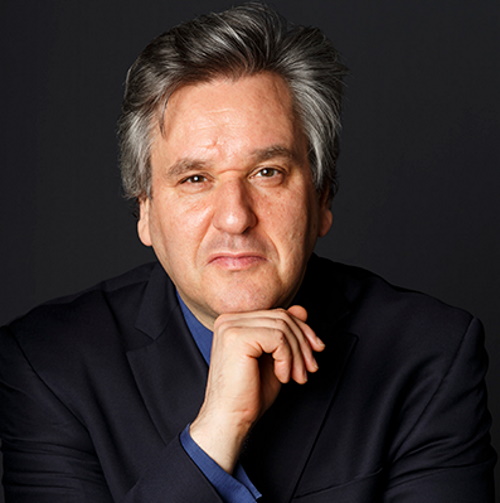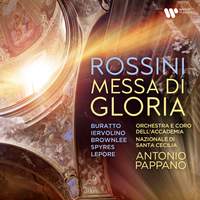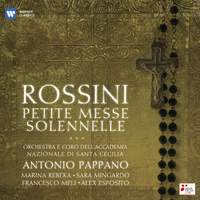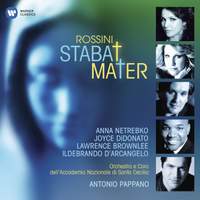Recording of the Week,
Rossini's Messa di Gloria from Antonio Pappano
As an avid Rossini-phile, I’m slightly ashamed to confess that the composer’s Messa di Gloria was a work which had almost entirely passed me by until this terrific new recording landed in my inbox recently – though in my defence it’s hardly a piece which gets regular outings. With the notable exception of Neville Marriner’s excellent account for Philips in the early 1990s, recordings have been few and far between, and the piece never once cropped up in the years I spent as a jobbing soloist on the choral society circuit amid regular bookings for the Petite messe solennelle and Stabat Mater. But following superb recordings of those two works, Antonio Pappano and his Santa Cecilia forces have decided it’s high time for this Cinderella (or should I say ‘Cenerentola’) to go to the ball – and in fine style, too.
 Unlike the Petite messe and Stabat Mater (both of which were composed after Rossini had bowed out from the operatic stage with Guillaume Tell in 1829), the Messa di Gloria is no ‘sin of old age’ but the work of a composer at the height of his popularity and powers. The piece was written at top-speed (one source suggests in just two days) in 1820, by which point Rossini had a string of enormously successful comic operas under his belt and was focusing on rather more ambiguous genres such as opera semiseria and melodramma: La donna del lago had opened the previous year, and the premiere of Maometto II was just around the corner.
Unlike the Petite messe and Stabat Mater (both of which were composed after Rossini had bowed out from the operatic stage with Guillaume Tell in 1829), the Messa di Gloria is no ‘sin of old age’ but the work of a composer at the height of his popularity and powers. The piece was written at top-speed (one source suggests in just two days) in 1820, by which point Rossini had a string of enormously successful comic operas under his belt and was focusing on rather more ambiguous genres such as opera semiseria and melodramma: La donna del lago had opened the previous year, and the premiere of Maometto II was just around the corner.
And those ongoing experiments in blending darkness and light are certainly reflected in the musical language of the Messa, right from the top: the Kyrie opens with a sequence of stern declamatory flourishes which would scarcely sound out of place in the Verdi Requiem, yet the clouds disperse in the space of a mere eight bars to give way to a sunny, smiling theme that would be right at home in the overture to Il barbiere di Siviglia. It’s a lovely moment, full of gentle impishness – almost as if the composer is shrugging off a sombre disguise designed to prank his audience - and Pappano paces and shades it beautifully, ensuring that the punchline lands exactly as it should.
 Thereafter, Rossini’s approach is unashamedly thick with theatrical greasepaint, and Pappano and his excellent quintet of soloists embrace its extravagance wholeheartedly. Perhaps the most striking feature here is the writing for two high-flying tenors (which might explain why choral societies are reluctant to tackle the work…). Rossini showcases the pair early on, setting the Christe Eleison as a ravishing bel canto duet, and how wonderful it is to have Lawrence Brownlee and Michael Spyres reunited here following their glorious Amici e rivali in 2020. These two singers really seem to breathe and phrase as one, and each gets his moment in the spotlight later on: Brownlee with the vertiginous Gratias agimus tibi (complete with an obbligato cor anglais which looks forward to Guillaume Tell) and Spyres with the fiendishly florid Qui tollis…Qui sedes, set as a straight-up operatic cavatina and cabaletta.
Thereafter, Rossini’s approach is unashamedly thick with theatrical greasepaint, and Pappano and his excellent quintet of soloists embrace its extravagance wholeheartedly. Perhaps the most striking feature here is the writing for two high-flying tenors (which might explain why choral societies are reluctant to tackle the work…). Rossini showcases the pair early on, setting the Christe Eleison as a ravishing bel canto duet, and how wonderful it is to have Lawrence Brownlee and Michael Spyres reunited here following their glorious Amici e rivali in 2020. These two singers really seem to breathe and phrase as one, and each gets his moment in the spotlight later on: Brownlee with the vertiginous Gratias agimus tibi (complete with an obbligato cor anglais which looks forward to Guillaume Tell) and Spyres with the fiendishly florid Qui tollis…Qui sedes, set as a straight-up operatic cavatina and cabaletta.
Eleonora Buratto (who sang the Priestess on Pappano’s much-garlanded Aida) excels in the similarly-structured Laudamus te, where her clean, full-toned soprano pirouettes with airy grace, and the other two soloists are no less distinguished. Teresa Iervolino’s firm but flexible contralto is such a joy in the Domine Deus that one wishes Rossini had given her an aria, and bass Carlo Lepore has a fine old time with the deliciously blustery Quoniam, sounding for all the world as if Dr Bartolo has popped into Mass. There’s a marvellous moment of glory here for clarinettist Alessandro Carbonare (the soloist in Prelude, Fugue and Riffs on Pappano’s Bernstein anniversary album), and indeed the woodwind-playing throughout is a delight – witness those burbling bassoon trills at the end of the Kyrie, or the sparkling filigree of the flute duet in the Laudamus.
Overall, then, it’s hard to imagine more accomplished or affectionate advocacy for a work which really deserves to get out more. One sniffy contemporary critic may have dismissed the Messa as ‘a ragout of Rossini’s operatic phrases’ – but personally I’m a fan of a good ragout.
Eleonora Buratto (soprano), Teresa Iervolino (contralto), Lawrence Brownlee (tenor), Michael Spyres (tenor), Carlo Lepore (bass)
Orchestra e Coro dell'Accademia Nazionale di Santa Cecilia, Antonio Pappano
Available Formats: CD, MP3, FLAC, Hi-Res FLAC
Marina Rebeka (soprano), Sara Mingardo (contralto), Francesco Meli (tenor), Alex Esposito (bass)
Orchestra e Coro dell’Accademia Nazionale di Santa Cecilia, Sir Antonio Pappano
Available Formats: 2 CDs, MP3, FLAC
Anna Netrebko (soprano), Joyce DiDonato (mezzo), Lawrence Brownlee (tenor), Ildebrando D'Arcangelo (bass)
Orchestra e Coro dell'Accademia Nazionale di Santa Cecilia, Antonio Pappano
Available Formats: CD, MP3, FLAC





